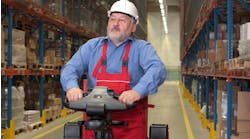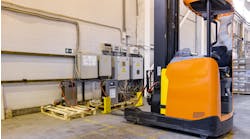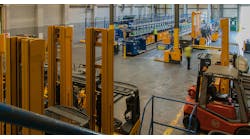Each year the editors of Material Handling Management solicit names of Material Handling Equipment Distributors Association (MHEDA) members who demonstrate exceptional skill in adding value to clients' businesses. We review the list of candidates and select one company we feel best exemplifies the term "value-added." This year's winner is Wiese Planning and Engineering of St. Louis.
MHEDA (Vernon Hills, Ill.) has much to be proud of. This year it celebrated 50 years as an association for distributors of material handling equipment, and launches its 50th annual convention on April 30th. Liz Richards, the association's executive vice president, says although names, faces, equipment, buildings and technologies change over time, important things remain. "MHEDA still exists for one basic purpose, to improve the proficiency of material handling distributors."
In determining the winner of this year's Value-Added Award, we worked with MHEDA to find its original member companies. From that group we selected Wiese Planning and Engineering, not only for its longevity, but its innovative approaches to solving customers' material handling challenges. Wiese Planning and Engineering has been honored as one of Cat Lift Trucks' Dealers of the Year consecutively from 1992 through 2004.
Wiese Planning and Engineering was founded in 1944 by Harold Wiese who died in January at age 95. He played an important role in the early days of MHEDA, helping to organize and encourage distributors in the St. Louis area to attend the first meeting in Chicago in May 1955. Thirty years ago, his son Chip joined the business.
In this interview with Chip, now president and CEO, he recalls the story of the company's early days and explains how many of the things his father achieved are still in place. Also, how the lessons that made Wiese Planning and Engineering successful, are still applicable in today's marketplace.
MHM: How did your father get into the material handling equipment business?
Harold was an electrical engineer during the Depression. He worked for some large companies, but didn't like the rigidity of corporate cultures as employment levels dwindled, and you never knew if your job was next. He was working for a small company that among other things sold Elwell-Parker Company [Bedford Park, Ill.] lift trucks.
He was in Cleveland on business and shared a cab with a fellow who told him about a new company making lift trucks, Towmotor. He went to see them, liked what they had to offer and they liked him. He became the first Towmotor rep in the St. Louis area. [Caterpillar purchased Towmotor Corp. in 1965.]
MHM: So he was in at the beginning of the lift truck industry. What was the business like 60 years ago?
In those days, during WWII, everything was different. Selling a lift truck was really selling a concept. You had to be innovative. For example, when your customer bought a truck, they got the truck, a parts manual and a repair manual. If they needed any parts they called the factory and the rep got a commission. If they needed repairs, well, they did it themselves. So my father got innovative. He became the first Towmotor dealer, maybe the first lift truck dealer, to stock parts. And he saw the need to offer service on trucks for customers, so he became the first company to offer service on what he sold.
MHM: And business thrived?
Not exactly! The war was on and for anyone to buy a truck they had to have permission from the government to make a purchase. Because of rationing, a company could not just buy a truck even when they saw the benefits. He was on the edge of going under when he got a customer who had permission from the government, in 48 hours, to make that purchase. The order kept his business afloat and he kept on going.
MHM: He was selling a concept?
Lift trucks were a new thing. People didn't know they needed them so it became application selling. Dad would look at how a company was handling material, then show them a better way. He added value to their business. For example, he went over to Anheuser-Busch here in St. Louis and watched them manually load beer kegs into trucks. They had a gang of men roll the kegs from the production area and load them into trailers. He showed them how, by palletizing the kegs and using a lift truck to load the pallets into trailers, they could increase productivity many-fold. The concept of palletizing kegs was so unique to Anheuser-Busch, it convinced them to begin palletizing kegs for shipping. It's also how Towmotor got its nickname, "the one-man gang." It meant one man on a lift truck could do the work of a whole gang.
MHM: Where did the "planning and engineering" part of the company name come from?
Sixty years ago everyone was doing everything manually. If you had a big job to be done, you threw labor at it. Except during the war, labor was getting scarce. So dad came up with the idea, and I'm sure others were doing the same things, of laying out a warehouse, using racking and shelving, creating lift truck paths, that sort of thing, to make the work flow through the building. It was the kind of thing an industrial engineer does today. In the course of doing that, his business had to change because customers would ask for these allied products when they saw the value of a planned warehouse. The goal then, as it is now, was to become what we call, the one safe source, a place where the customer can solve all of his material handling problems. People used to go to many sources for their material handling needs, but we saw a way to fulfill all those needs.
MHM: Since then, the company has grown to become one of the larger material handling equipment distributors in the Midwest.
We certainly have. We now employ more than 500 people in our 25 branches in four states. We've kept our focus on offering powered industrial products, along with basic racking and shelving and kept looking for ways to solve customers' problems.
MHM: So then the idea was customer service?
Absolutely. We've stayed away from big conveyor applications and stuck with lift trucks and allied products. [The company offers Caterpillar, Mitsubishi, Kalmar and Royal lift trucks in its equipment line.] And we handle other products to improve working conditions, such as floor sweepers and platform lifts. Another product my dad saw the benefit of when few others did, was the Trackmobile. It's a railcar switcher invented over here in Illinois in the early 1950s. Dad sold the first one built and it's become an important segment of our business.
MHM: Part of the value proposition is seeing benefits others might not see, selling concepts rather than products, and what else?
You need a simple mission. Our whole idea is based on scriptural principles: Taking care of people and treating them as we'd like to be treated. We apply those principles to our customers and suppliers, as well as our employees.
MHM: What benefits can a company or individual get from belonging to an organization like MHEDA?
It's a great organization. We joined in 1955 and dad said the only reason he was not considered a founder was because he was busy the day the founders held their first meeting! You can learn only so much from text books, manufacturers' training and seminars. You can also learn an equal amount from your peers. I believe that God gives everyone special gifts and you have to seek those out. There's never a time that I don't visit another distributor or go to a meeting, that I don't learn some simple little thing that improves our business. Contact with your peers is the only way to pick up those little innovations or best practices that someone else has learned, maybe the hard way.
MHM: The challenges your father faced seem obvious in retrospect. What kinds of challenges are you facing today?
The classic challenge exists in that the whole distribution channel is being challenged in so many ways. Business is more competitive that it ever was. And that drives all kinds of things, supply-chain management for example. Now we have all sorts of people who were not involved in material handling as recently as five years ago.
MHM: How does a firm work through that?
The great thing about our free-market system is that it drives itself down to the most efficient way of doing business. You have to be in line with that, recognize that change is coming, or you get run over by it.
MHM: Do you have an active online business?
Well, we do some Web business. Not a lot. The Web seems best suited for commodity-type products. We do things a bit differently. We feel we bring value to the equation that a customer can't get from the Web. We're heavily product-support oriented in our approach to selling. Part of our goal is to take the customer out of the material handling equipment business. We want him to focus on what he does best so we can focus on what we do best. I believe it's a viable thing. We know what our core competency is and the customer knows his core competency.
MHM: Can you give me an example?
Lift trucks. We're doing more leasing all the time. The customer is looking for a fixed cost so that he can make informed budget decisions. We'll go to the customer, purchase his entire fleet, then lease the trucks back to him at a fixed cost that includes maintenance, parts and service.
MHM: What things have you done within your own business to improve efficiencies?
Plenty of things. Our most recent innovation is to launch a Six Sigma program, dedicating an individual to the program fulltime. It's already beginning to bear fruit. We look at best practices and review how we do everything, always with the thought of how we might do it better.
MHM: What excites you about the business these days?
Some of the bigger thrills we get out of our business is another part of our mission: To have fun! And part of the satisfaction, the fun, is when you do a job for someone and you watch their reaction. You can explain how to do it on paper, even if they think they're doing a fair job of material handling, but when the system is in and they say, "Wow!" you know you've made your point.
MHM: Are customers aware of the potentials of material handling, or how to do things?
My perception is that customers are becoming more educated in the ways of material handling. They've seen different techniques and are more knowledgeable about the equipment. But their frame of reference is off. They don't see the whole picture and how all the pieces fit. They know just segments of the business. Our job is, and has always been, to show them that whole picture. Also, as companies "right size" and fewer people do more work, they become too busy. They begin to look around for solutions from the outside. Once they have confidence in your ability to deliver what they need, and are aware that you are treating them fairly, they accept the turnkey approach to material handling.
Chip and Harold Wiese with one of the company's original (circa 1950) service trucks, now restored.


